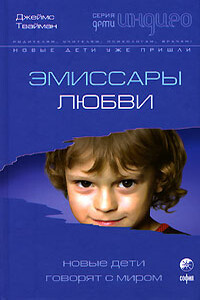Оксфордское руководство по психиатрии - [545]
Lemere, F., Voegtlin, W. L., Broz, W. R., O’Hailaren, P., and Tupper, W. E. (1942). Conditioned reflex treatment of chronic alcoholism. VIII: a review of six years experience with this treatment of 1526 patients. Journal of the American Medical Association 120, 269-70.
Lemert, E. (1951). Social pathology: a systematic approach to the theory of sociopathic behaviour. McGraw-Hill, New York.
Lemoine, P., Harousseau, H., Borteyru, J. -P., and Menuet, J. -C. (1968). Les enfants de parents alcooliques: anomalies observées à propos de 127 cas. Ouest Médical 25, 477-82.
Leonhard, K. (1957). The classification of endogenous psychoses. English translation of the 8th German edition of Aufteiling der Endogenen Psychosen by R. Berman. Irvington. New York (1979).
Leonhard, K., Korff, I., and Schulz, H. (1962). Die Temperamente und den Familien der monopolaren und bipolaren phasishen Psychosen. Psychiatrie und Neurologie 143, 416-34.
Lerer, B., Moore, N., Meyendorff, E., Cho, S. R., and Gershon, S. (1987). Carbamazepine versus lithium in mania: a double blind study. Journal of Clinical Psychiatry 48, 89–93.
Lerman, C. E. (1987). Rheumatoid arthritis: psychological factors in the etiology, course, and treatment. Clinical Psychology Review 7, 413-25.
Levenson, J. L., Hamer, R. M., Myers, T., Hart, R. P., and Kaplowitz, L. G. (1987). Psychological factors predict symptoms of severe recurrent genital herpes infection. Journal of Psychosomatic Research 31, 153-9.
Levy, N. B. (1986). Renal transplantation in the new medical era .Advances in Psychosomatic Medicine 15, 167-79.
Levy, R. and Post, F. (1982). The psychiatry of late life. Blackwell, Oxford.
Levy, R., Isaacs A., and Hawks, G. (1970). Neurophysiological correlates of senile dementia: I. Motor and sensory nerve conduction velocity. Psychological Medicine 1,40-7.
Levy, R., Janssen, R., Bush, T., and Rosenblum, M. (1988). Neuroepidemiology of AIDS. Journal of Acquired Immune-Deficiency Syndromes 1, 81-8.
Lewis, A. J. (1934). Melancholia: a clinical survey of depressive states. Journal of Mental Science 80, 277-8.
Lewis, A. J. (1936a). Melancholia: prognostic study and case material. Journal of Mental Science 82, 488–558.
Lewis, A. J. (1936b). Problems of obsessional neurosis. Proceedings of the Royal Society of Medicine 29, 325-36.
Lewis, A. J. (1938). States of depression: their clinical and aetiological differentiation. British Medical Journal ii, 875-8.
Lewis, A. J. (1942). Discussion on differential diagnosis and treatment of post confusional states. Proceedings of the Royal Society of Medicine 35, 607-14.
Lewis, A. J. (1953a). Hysterical dissociation in dementia paralytica. Monatsschrift für Psychiatrie und Neurologie 125, 589–604.
Lewis, A. J. (1953b). Health as a social concept. British Journal of Sociology 4, 109-24.
Lewis, A. J. (1956). Psychological medicine. In Price’s textbook of the practice of medicine (ed. D. Hunter) (9th edn). Oxford University Press, London.
Lewis, A. J. (1957). Obsessional illness. Acta Neuropsiquiàtrica Argentina 3, 323-35. Reprinted as Chapter 7 in Inquiries in psychiatry: clinical and social investigations. Routledge and Kegan Paul, London.
Lewis, A. J. (1968). A glossary of mental disorders. Studies on medical and population subjects 22. General Register Office. HMSO, London.
Lewis, A. J. (1970). Paranoia and paranoid: a historical perspective. Psychological Medicine 1, 2-12.
Lewis, A. J. (1976). A note on classification of phobia. Psychological Medicine 6, 21-2.
Lewis, E. (1979). Grieving by the family after a stillbirth or neonatal death. Archives of the Diseases of Childhood 54, 303-6.
Lewis, E. O. (1929). Report on an investigation into the incidence of mental deficiency in six areas. 1925-27. In Report of the mental deficiency committee, Part IV. HMSO, London.
Lewis, H. R. and Streitfeld, H. S. (1970). Growth games. Harcourt Brace Jovanovich, New York.
Lewis, N. D. S. and Yarnell, P. (1951). Pathological firesetting. Nervous and Mental Diseases Monograph No. 82. New York.
Lex, B. W. (1985). Alcohol problems in special populations. In The diagnosis and treatment of alcoholism (ed. J. H. Mendelson and N. K. Mello). McGraw-Hill, New York.
Ley, P. (1977). Psychological studies of doctor-patient communication. In Contributions to medical psychology (ed. S. Rachman), Vol. 1. Pergamon Press, Oxford.
Ley, P. (1982). Satisfaction, compliance and communication. British Journal of Clinical Psychology 21, 241-54.
Lhermitte, J. (1951). Visual hallucinations of the self. British Medical Journal i, 431-4.
Liakos, A. (1967). Familial transvestism. British Journal of Psychiatry 113, 49–51.
Liberman, R. P., Mueser, K. T., Wallace, C. J., et al. (1986). Training skills in the psychiatrically disabled: learning coping and competence. Schizophrenia Bulletin 12, 631-47.
Lidz, R. W. and Lidz, T. (1949). The family environment of schizophrenic patients. American Journal of Psychiatry 106, 332-45.
Lidz, T., Fleck, S., and Cornelison, A. (1965). Schizophrenia and the family. International Universities Press, New York. Lieberman, M. A., Yalom, I. D., and Miles, M. B. (1973).

В своей публикации мне хочется обратиться к открытиям исследователей российской истории, создателей «Новой хронологии» А.Т.Фоменко и Г.В. Носовскому (в сокращении: ФН), уже не один год будоражащим российское общество, которое, тем не менее, вовсе не проникается к ним заметной благодарностью.Скорее наоборот: смелые и даровитые приверженцы истины получают болезненные упрёки от обывателей и записных академиков то в фальсификациях и подделках, то в дилетантизме и жажде денежной поживы.

Текст классика современного психоанализа, в «популярной» форме резюмирующий основные принципы его дискурсивной практики примени¬тельно к различным областям повседневного человеческого существования.

В книге рассказывается история главного героя, который сталкивается с различными проблемами и препятствиями на протяжении всего своего путешествия. По пути он встречает множество второстепенных персонажей, которые играют важные роли в истории. Благодаря опыту главного героя книга исследует такие темы, как любовь, потеря, надежда и стойкость. По мере того, как главный герой преодолевает свои трудности, он усваивает ценные уроки жизни и растет как личность.

Хотя эта книга читается как увлекательный роман, его содержание — необычный личный опыт Джеймса Тваймана, сопровождавший его знакомство с Детьми Оз — детьми с необычайными психическими возможностями. Объединяет столь непохожих между собой детей вопрос, который они хотят задать каждому из нас. Приключение, которое разворачивается перед нами, оказывается не просто увлекательным — вдохновляющим. И вопрос этот способен круто повернуть жизнь каждого человека на этой планете.О чем же спрашивают нас эти дети?«Как бы выглядел наш мир, если бы мы все немедленно, прямо сейчас осознали, что все мы — Эмиссары Любви?»Такую книгу вы захотите подарить вашим друзьям — не только взрослым, но и детям тоже.

Книга, которая лежит перед вами, познакомит с историей гипноза, тайнами сознания и подсознания, видами внушения, методикой погружения в гипноз, углубления гипнотического состояния и выхода из транса.

Книга является первым в России историческим очерком трансперсонального проекта в российской культуре. Авторы книги, доктор психологических наук, профессор Владимир Козлов и кандидат философских наук Владимир Майков, проанализировали эволюцию трансперсональной идеи в контексте истории психологии, философии, антропологии и духовных традиций.Во втором томе исследуется русская трансперсональная традиция и выявляются общие характерные особенности трансперсональной парадигмы в России и трансперсонального мировоззрения нашего народа и великих российских мыслителей.